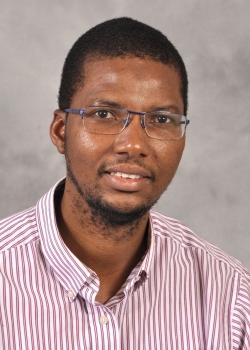Postbaccalaureate Research and Education Program at Upstate Medical University (PREP-Up)
Monday, June 3, 2024 through Wednesday, May 31, 2025
Dr. Bruce Knutson, Director
Dr. Alaji Bah, Codirector
Program Flyer
Program Brochure
About the Program
The State University of New York Upstate Medical University, College of Graduate Studies is offering research training opportunities for its Postbaccalaureate Research and Education Program (PREP-Up). The program’s focus is to strengthen the research skills and academic competitiveness of program participants in an effort to help meet the critical need for diverse investigators in basic and translational research, particularly individuals from disadvantaged backgrounds.
Students accepted into the program will work as apprentice scientists under the supervision of an established biomedical scientist and participate in courses for skill development. Each student will be provided a salary and benefits for the 12-month period as well as the opportunity of taking two full-credit courses free of charge.
Students will attend research seminars, present and participate in a student journal club, present their work, and participate in discussions on research career development and how to apply to graduate school. Students are given ample opportunities to interact directly with many of our faculty and graduate students.
The program runs from Monday, June 3, 2024, through Wednesday, May 31, 2025.
Applicants should be undergraduate students from underrepresented groups in good academic standing, who will have completed their senior year of study by the end of spring semester 2024, and are majors in biomedically related field, such as chemistry, biology, neuroscience, microbiology, etc.
Applicants must have a strong interest in pursuing a career in basic biomedical research, and are expected to pursue rigorous, research-focused doctoral degree programs (e.g., PhD or MD/PhD) in biomedical fields. Individuals who graduated within the last two years are also eligible.
The main criteria for the selection of students will be personal scholarship, academic excellence, and the match of applicant interests with those of participating SUNY Upstate Medical University biomedical faculty members.
Eligibility Requirements
Applicants must be US citizens or hold permanent resident status, and also qualify as members of groups underrepresented in biomedical sciences, including economically disadvantaged students and those with disabilities. For more information, please see the following link - http://grants.nih.gov/grants/guide/notice-files/NOT-OD-20-031.html
The program is tailored for undergraduates who have great potential and enthusiasm for science, yet lack extensive research experience and are therefore less competitive for the most rigorous biomedical graduate programs. We especially seek to recruit individuals who have BA/BS degrees in biomedically-related sciences, with a G.P.A.s of at least 3.0 and who lack substantial research experience.
We are particularly interested in recruiting individuals from groups that are under-represented in the biomedical sciences. The NIH has reported that groups under-represented in biomedical or behavioral research include African-Americans, Hispanic-Americans or Latino/a, American Indians, Alaskan Natives, and Pacific Islanders, individuals from disadvantaged socio-economic backgrounds and disabled persons. First generation college students are also encouraged to apply.
Application
How To Apply
- Complete the PREP-Up online application.
- Submit a personal statement of your academic goals and career objectives, some areas of research in the Biomedical Sciences which currently interest you, describe your reasons for wanting to attend the PREP-Up program, and how the program would help elevate your career as an underrepresented candidate.
- Submit an official transcript of your undergraduate study to date.
- Submit a professional resume or curriculum vitae (CV) that reflects your experience. This resume can include full-time or part-time positions, internships, and/or volunteer experience.
- Have at least two letters of recommendation submitted to the PREP-Up Program. The letters of recommendation may be requested from professors related to your major, an advisor, and/or department chair. (Letters of recommendation can be mailed, or emailed, by your recommender to the program.)
Mail supplemental documents to:
SUNY Upstate Medical University
College of Graduate Studies
PREP-Up Program
Room 3122, Weiskoktten Hall
766 Irving Avenue
Syracuse, NY 13210
315 464-4541
FAX: 315-464-4544
Email: prep-up@ngskmc-eis.net
Deadline for Applications: March 31, 2024 or when all positions are filled.
Postbaccalaureate Research and Education Program at Upstate Medical University Mentors

David Auerbach, PhD
Examine the prevalence, risks, and mechanisms for electrical disturbances in both the brain and heart.

Alaji Bah, PhD
Regulation of binding, folding and phase separation of intrinsically disordered proteins by post-translational modifications.

Marie Bechler, PhD
Determining mechanisms that drive central nervous system myelin sheath formation and how myelin contributes to function in neurodevelopment and neurodegenerative disease.

Peter Calvert, PhD
We study the mechanisms by which neurons in the retina partition into functional compartments, and how this process is derailed in neurodegenerative diseases.

Gary Chan, PhD
Human cytomegalovirus pathogenesis and persistence.

Huaiyu Hu, PhD
Mechanisms and therapy development for retinitis pigmentosa that causes blindness.

Patricia Kane, PhD
Genetics, genomics, and biochemistry of cellular pH regulation.

Bruce Knutson, PhD
Mechanism of RNA polymerase I transcription and its dysregulation in cancer and craniofacial dismorphologies.

Leszek Kotula, MD/PhD
Genetic and molecular mechanisms of tumor progression.

Mira Krendel, PhD
Our lab uses live cell imaging to study how defects in cell migration and adhesion can cause human kidney disease, promote cancer progression, and disrupt immune functions.

Yingxi Lin, PhD
Using multi-disciplinary approaches to explore molecular and synaptic mechanisms of learning, memory and neurological disorders.

Chunyu Liu, PhD
My lab focuses on using a comprehensive approach that is composed of genetics, bioinformatics, genomics, cellular models to identify the molecular mechanisms of major psychiatric diseases, particularly bipolar disorder and schizophrenia, as well as related human psychological behavioral traits.

Juntao Luo, PhD
My research focuses on developing nanotechnology and pharmaceutics for disease treatments.

Francesca Pignoni, PhD
Signaling pathways and transcription factors in eye development.

Dave Pruyne, PhD
We study the development of muscle, and specifically the assembly of the muscle cytoskeleton, using a combination of vertebrate and invertebrate model systems, and in vitro biochemistry.

Harry Taylor, PhD
Our research aims to advance our understanding of the interplay between viral pathogens, host metabolism, and the immune system in the context of both AIDS and COVID-19.

Saravanan Thangamani, PhD
The overall objective of my lab is to unravel the biology of disease transmission by ticks and mosquitoes, and to develop novel countermeasures to control and prevent tick and mosquito-borne diseases such as Lyme, Powassan encephalitis, Chikungunya and Zika virus disease.

Cynthia Weickert, PhD
Discovering the biological basis of Schizophrenia.

Thomas W. Weickert, PhD
Our clinical neuroscience research program uses molecular neurobiological, neuroimaging and neurocognitive findings to guide our research using brain stimulation and/or re-purposed, approved medication as add-on therapies to antipsychotics to improve thinking ability and reduce symptom severity in people with schizophrenia and related psychoses.

Joel Wilmore, PhD
Our research focuses on the interaction between the microbiome and immune system, and how these interactions lead to systemic IgA antibody responses that are involved in protection from sepsis.

Richard JH Wojcikiewicz, PhD
Intracellular signaling and protein-protein interactions in mammalian cells.

